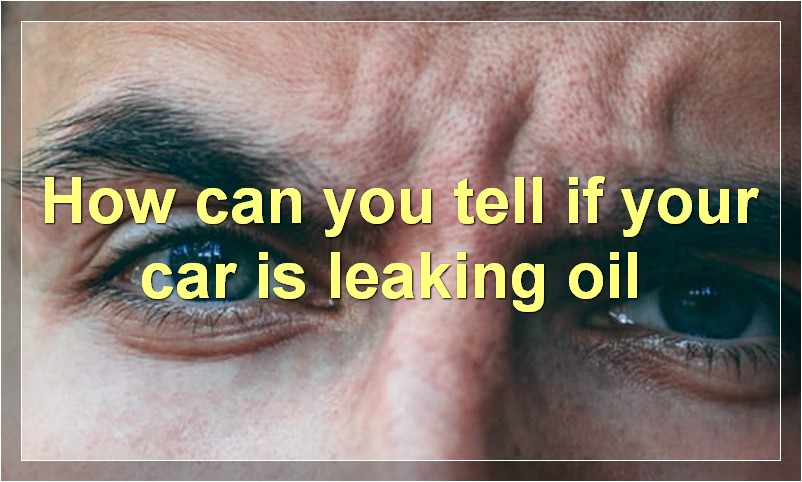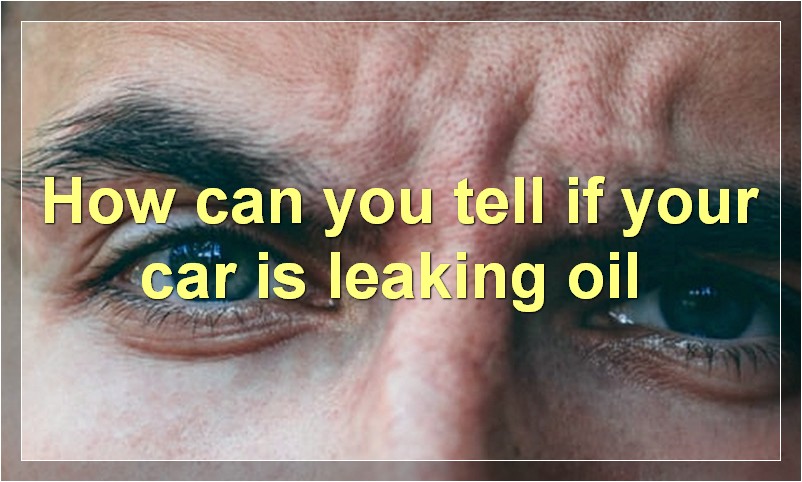If your car is leaking oil, it’s important to take care of the problem as soon as possible. Oil leaks can cause engine damage, and they’re also a fire hazard. In this article, we’ll show you how to fix an oil leak.
What are the most common reasons for cars to leak oil?
Cars are designed to run on oil, so it stands to reason that one of the most common reasons for cars to leak oil is a faulty oil seal. Oil seals are responsible for keeping the oil in the engine, and if they fail, oil will begin to leak. Other common reasons for cars to leak oil include:
-A hole in the oil pan: The oil pan is located at the bottom of the engine and is responsible for holding all of the engine’s oil. If there is a hole in the oil pan, oil will begin to leak out.
-A damaged gasket: A gasket is a seal that is located between two components in the engine, such as the cylinder head and the block. If a gasket is damaged, it can cause an oil leak.
-Worn piston rings: Piston rings are responsible for sealing the gap between the piston and the cylinder wall. If these rings wear out, oil can leak past them and into the combustion chamber.
How can you tell if your car is leaking oil?

If you’re a car owner, it’s important to know the signs that your car is leaking oil. Oil leaks can cause serious engine damage, so it’s important to be able to identify them and get them fixed as soon as possible.
One of the most common signs that your car is leaking oil is an oil spot on the ground where you park your car. If you notice an oil spot, it’s important to clean it up immediately and then check your car for leaks.
Another common sign of an oil leak is low oil levels on your dipstick. If you’re regularly checking your oil levels and you notice that they’re low, it could be because your car is leaking oil.
If you see any signs that your car is leaking oil, it’s important to take it to a mechanic and have it checked out as soon as possible. Oil leaks can cause serious engine damage, so it’s important to get them fixed before they cause any major problems.
What are the consequences of driving a car with an oil leak?
An oil leak can have many consequences for your car. The most obvious is that it will cause your engine to run less efficiently, as the oil will not be properly lubricating the engine parts. This can lead to increased wear and tear on the engine, and may eventually cause the engine to seize up completely. In addition, an oil leak can damage other parts of your car, such as the exhaust system. The oil can also drip onto the road, making it slippery and dangerous for other drivers. If you have an oil leak, you should take your car to a mechanic as soon as possible to have it fixed.
How do you fix an oil leak?
If you have an oil leak, the first thing you need to do is determine the source of the leak. Once you know where the leak is coming from, you can decide what type of repair is necessary. If the leak is coming from a gasket or seal, you may be able to simply replace the damaged part. If the leak is coming from a cracked engine block or oil pan, you will need to have the damage repaired by a professional.
What are the signs that your car needs an oil change?
It’s important to keep your car in good working order. That means regular oil changes. But how do you know when it’s time for an oil change? Here are a few signs to watch for:
1. Check your mileage
Your car’s owner’s manual should have a recommended mileage interval for oil changes. For example, most cars can go about 5,000 miles between changes under normal driving conditions. But if you drive in stop-and-go traffic or mostly short distances, you may need to change your oil more frequently.
2. Look for the warning light
Most cars have an oil-change indicator light that will come on when it’s time for an oil change. If you see this light, it’s time to take your car in for service.
3. Check your oil level
If you don’t have an indicator light, you can check your car’s oil level yourself. First, find the dipstick and pull it out. Wipe it clean with a rag and insert it back into the tube. Then, pull it out again and check the level. If it’s low, add more oil until it reaches the “full” line on the dipstick.
4. Look for leaks
If you see oil stains on your driveway or garage floor, it could be a sign of an oil leak. Check under your car to see if there are any drips or puddles of oil. If there are, it’s best to take your car in for repair as soon as possible.
5. Listen for unusual noises
If your engine starts making strange noises, it could be a sign that your oil is dirty or low. Pay attention to grinding, rattling or clicking sounds coming from under the hood. If you hear anything out of the ordinary, have your mechanic take a listen.
6. Check your exhaust fumes
If you notice blue or black smoke coming from your tailpipe, it could be an indication that your oil is burning. This is usually a sign of a serious problem and should be checked out by a professional immediately.
7. Feel for unusual vibrations
If you start to feel unusual vibrations coming from your engine, it could be a sign that your engine is running low on oil. These vibrations are most noticeable at high speeds or when accelerating uphill. If you suspect this is the case, pull over and check your oil level right away.
If you notice any of these signs, it’s time to get an oil change. Don’t wait too long, as driving with dirty or low oil can cause serious damage to your engine.
Why is it important to change your car’s oil regularly?

Many car owners may not realize the importance of changing their car’s oil regularly, but it is actually one of the most important maintenance tasks that should be performed on a vehicle. Here are a few reasons why:
1. Keeps your engine clean – Over time, oil can become dirty and start to clog up your engine. This can lead to decreased performance and fuel efficiency as well as increased wear and tear on engine components. By changing your oil regularly, you can help keep your engine clean and running smoothly.
2. Protects against wear and tear – Engine oil acts as a lubricant, helping to protect against metal-to-metal contact between moving parts. This can help to prevent premature wear and tear on engine components, extending the life of your engine.
3. Helps to cool the engine – As oil circulates through the engine, it helps to dissipate heat, keeping the engine running at a cooler temperature. This can help to prevent overheating and engine damage.
4. Improves fuel efficiency – A dirty or old oil filter can restrict the flow of oil to the engine, causing it to work harder and use more fuel. Replacing your filter and changing your oil regularly can help to improve your vehicle’s fuel efficiency.
5. Prevents costly repairs – Neglecting to change your car’s oil can lead to serious engine damage, which can be costly to repair. By changing your oil regularly, you can help avoid these costly repairs and keep your vehicle running smoothly for years to come.
What happens if you don’t change your car’s oil often enough?
If you don’t change your car’s oil often enough, the oil will become dirty and won’t be able to do its job of lubricating the engine. The engine will then overheat and eventually break down.
How often should you change your car’s oil?
Your car’s oil needs to be changed every 3,000 miles or every 3 months, whichever comes first.
What are the symptoms of an engine that is low on oil?
As your car’s engine runs, it consumes oil. The oil level in your engine should be checked regularly to ensure that it is topped up and maintained. If your engine is low on oil, there are a few tell-tale signs to watch out for.
If you notice any of the following, it’s time to check your oil level and top up if necessary:
1. Your engine is making strange noises
If your engine is low on oil, it will often make a rattling noise when you start the car. This is because the oil isn’t adequately lubricating the moving parts in your engine, causing them to rub together and create a distinctive sound.
If you hear this noise, it’s important to check your oil level as soon as possible and top up if necessary. Failing to do so could cause serious damage to your engine.
2. Your car is smoking
Another symptom of an engine that is low on oil is smoking from the exhaust pipe. This is usually accompanied by a burning smell and can indicate that the oil level is dangerously low.
If you see smoke coming from your car’s exhaust, pull over and check the oil level immediately. If it’s low, top it up and continue your journey. If the problem persists, seek professional help as there may be a more serious issue with your car’s engine.
3. Your engine warning light is on
Most modern cars have an engine warning light on the dashboard that will illuminate if there is a problem with the engine. If this light comes on, it’s worth checking your oil level to see if it’s the cause.
If the light stays on after topping up the oil, or if you notice any other unusual symptoms, it’s best to take your car to a mechanic and have it checked out. They will be able to diagnose and fix any underlying issues.
4. Your car isn’t performing as well as usual
If your car’s engine is low on oil, it won’t be able to perform at its best. You may notice that acceleration is slower than usual or that the engine feels like it’s struggling when you’re driving uphill.
This loss of performance is due to the fact that the moving parts in your engine aren’t being properly lubricated, which reduces efficiency and power. If you notice a drop in performance, it’s worth checking your oil level and topping up if necessary.
What are the causes of an engine oil leak?
An engine oil leak can have many different causes. The most common cause is a faulty gasket or seal. These can be caused by many different things, such as age, wear and tear, or even manufacturing defects. Other common causes of engine oil leaks include:
• Worn or damaged piston rings: Piston rings seal the gap between the piston and the cylinder wall. Over time, they can become worn or damaged, causing an oil leak.
• Cracks in the engine block or cylinder head: If there are cracks in the engine block or cylinder head, oil can leak out.
• Loose oil drain plug: If the oil drain plug is not tightened properly, it can come loose and cause an oil leak.
• Damaged oil filter: A damaged oil filter can also cause an oil leak.
If you suspect that you have an oil leak, it is important to have it repaired as soon as possible. If left unrepaired, an oil leak can lead to serious engine damage.




